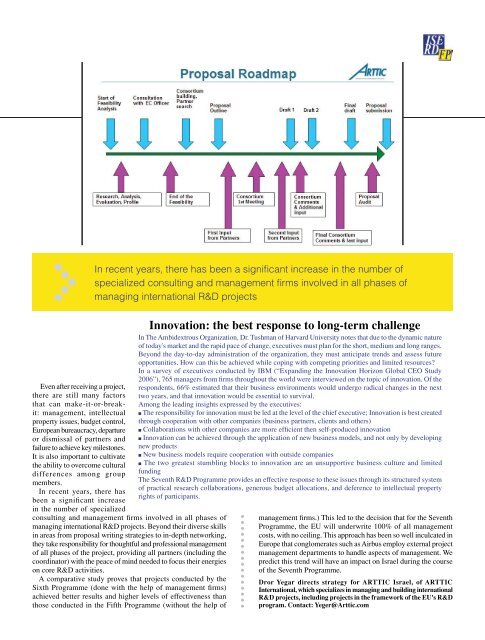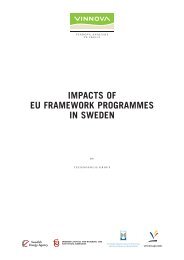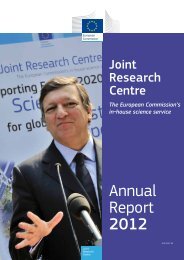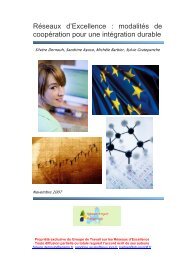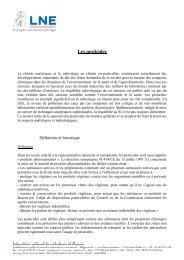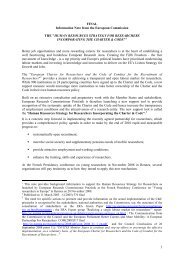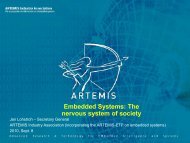Télécharger le document - Eurosfaire
Télécharger le document - Eurosfaire
Télécharger le document - Eurosfaire
Create successful ePaper yourself
Turn your PDF publications into a flip-book with our unique Google optimized e-Paper software.
Even after receiving a project,<br />
there are still many factors<br />
that can make-it-or-breakit:<br />
management, intel<strong>le</strong>ctual<br />
property issues, budget control,<br />
European bureaucracy, departure<br />
or dismissal of partners and<br />
failure to achieve key mi<strong>le</strong>stones.<br />
It is also important to cultivate<br />
the ability to overcome cultural<br />
differences among group<br />
members.<br />
In recent years, there has<br />
been a significant increase<br />
in the number of specialized<br />
In recent years, there has been a significant increase in the number of<br />
specialized consulting and management firms involved in all phases of<br />
managing international R&D projects<br />
consulting and management firms involved in all phases of<br />
managing international R&D projects. Beyond their diverse skills<br />
in areas from proposal writing strategies to in-depth networking,<br />
they take responsibility for thoughtful and professional management<br />
of all phases of the project, providing all partners (including the<br />
coordinator) with the peace of mind needed to focus their energies<br />
on core R&D activities.<br />
A comparative study proves that projects conducted by the<br />
Sixth Programme (done with the help of management firms)<br />
achieved better results and higher <strong>le</strong>vels of effectiveness than<br />
those conducted in the Fifth Programme (without the help of<br />
Innovation: the best response to long-term chal<strong>le</strong>nge<br />
In The Ambidextrous Organization, Dr. Tushman of Harvard University notes that due to the dynamic nature<br />
of today's market and the rapid pace of change, executives must plan for the short, medium and long ranges.<br />
Beyond the day-to-day administration of the organization, they must anticipate trends and assess future<br />
opportunities. How can this be achieved whi<strong>le</strong> coping with competing priorities and limited resources?<br />
In a survey of executives conducted by IBM (“Expanding the Innovation Horizon Global CEO Study<br />
2006”), 765 managers from firms throughout the world were interviewed on the topic of innovation. Of the<br />
respondents, 66% estimated that their business environments would undergo radical changes in the next<br />
two years, and that innovation would be essential to survival.<br />
Among the <strong>le</strong>ading insights expressed by the executives:<br />
n The responsibility for innovation must be <strong>le</strong>d at the <strong>le</strong>vel of the chief executive; Innovation is best created<br />
through cooperation with other companies (business partners, clients and others)<br />
n Collaborations with other companies are more efficient then self-produced innovation<br />
n Innovation can be achieved through the application of new business models, and not only by developing<br />
new products<br />
n New business models require cooperation with outside companies<br />
n The two greatest stumbling blocks to innovation are an unsupportive business culture and limited<br />
funding<br />
The Seventh R&D Programme provides an effective response to these issues through its structured system<br />
of practical research collaborations, generous budget allocations, and deference to intel<strong>le</strong>ctual property<br />
rights of participants.<br />
management firms.) This <strong>le</strong>d to the decision that for the Seventh<br />
Programme, the EU will underwrite 100% of all management<br />
costs, with no ceiling. This approach has been so well inculcated in<br />
Europe that conglomerates such as Airbus employ external project<br />
management departments to hand<strong>le</strong> aspects of management. We<br />
predict this trend will have an impact on Israel during the course<br />
of the Seventh Programme.<br />
Dror Yegar directs strategy for ARTTIC Israel, of ARTTIC<br />
International, which specializes in managing and building international<br />
R&D projects, including projects in the framework of the EU's R&D<br />
program. Contact: Yeger@Arttic.com


